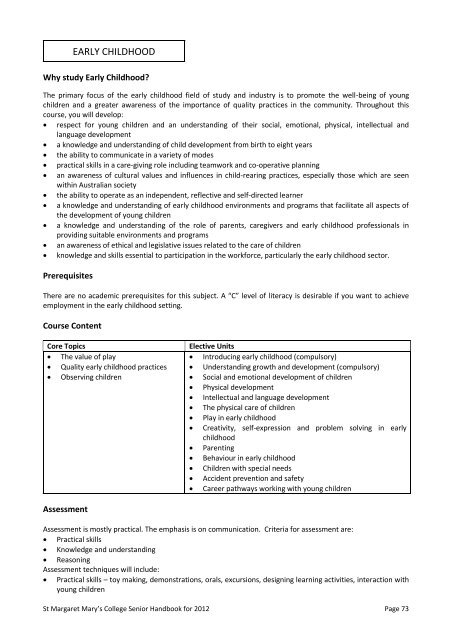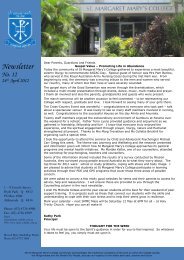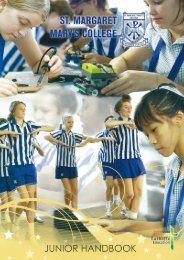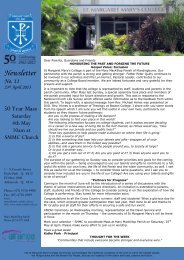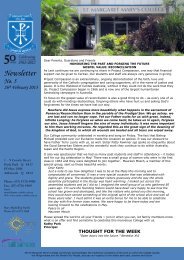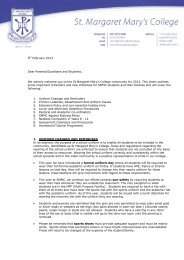SENIOR HANDBOOK for 2012
PRINCIPAL'S MESSAGE - St Margaret Mary's College
PRINCIPAL'S MESSAGE - St Margaret Mary's College
- No tags were found...
Create successful ePaper yourself
Turn your PDF publications into a flip-book with our unique Google optimized e-Paper software.
EARLY CHILDHOOD<br />
Why study Early Childhood?<br />
The primary focus of the early childhood field of study and industry is to promote the well-being of young<br />
children and a greater awareness of the importance of quality practices in the community. Throughout this<br />
course, you will develop:<br />
respect <strong>for</strong> young children and an understanding of their social, emotional, physical, intellectual and<br />
language development<br />
a knowledge and understanding of child development from birth to eight years<br />
the ability to communicate in a variety of modes<br />
practical skills in a care-giving role including teamwork and co-operative planning<br />
an awareness of cultural values and influences in child-rearing practices, especially those which are seen<br />
within Australian society<br />
the ability to operate as an independent, reflective and self-directed learner<br />
a knowledge and understanding of early childhood environments and programs that facilitate all aspects of<br />
the development of young children<br />
a knowledge and understanding of the role of parents, caregivers and early childhood professionals in<br />
providing suitable environments and programs<br />
an awareness of ethical and legislative issues related to the care of children<br />
knowledge and skills essential to participation in the work<strong>for</strong>ce, particularly the early childhood sector.<br />
Prerequisites<br />
There are no academic prerequisites <strong>for</strong> this subject. A “C” level of literacy is desirable if you want to achieve<br />
employment in the early childhood setting.<br />
Course Content<br />
Core Topics<br />
The value of play<br />
Quality early childhood practices<br />
Observing children<br />
Elective Units<br />
Introducing early childhood (compulsory)<br />
Understanding growth and development (compulsory)<br />
Social and emotional development of children<br />
Physical development<br />
Intellectual and language development<br />
The physical care of children<br />
Play in early childhood<br />
Creativity, self-expression and problem solving in early<br />
childhood<br />
Parenting<br />
Behaviour in early childhood<br />
Children with special needs<br />
Accident prevention and safety<br />
Career pathways working with young children<br />
Assessment<br />
Assessment is mostly practical. The emphasis is on communication. Criteria <strong>for</strong> assessment are:<br />
Practical skills<br />
Knowledge and understanding<br />
Reasoning<br />
Assessment techniques will include:<br />
Practical skills – toy making, demonstrations, orals, excursions, designing learning activities, interaction with<br />
young children<br />
St Margaret Mary’s College Senior Handbook <strong>for</strong> <strong>2012</strong> Page 73


